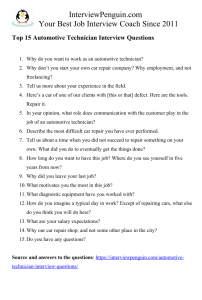Having a car is en expensive endeavor. You pay for petrol, insurance, regular emission inspections and diagnostic testing, new tires, and so on. On the top of that, most cars aren’t as reliable as their dealers proclaim. Parts get worn out–some after a year, some after two or five or ten. But there is always something to repair, and to pay for.
Instead of being the one who pays, however, you can become the one who gets the money. Automotive technicians and companies who employ them, benefit from the fact that almost everyone has a car today (often more than one), and that people cannot live without their cars–sometimes for a single day. If something gets broken or worn our or scratched, they drive to the car repair shop immediately, ready to open their wallet.
Let’s have a look at some questions you may face while interviewing for this job.
Table of Contents
Why do you want to work as an automotive technician?
Because you love cars and repairing them. You enjoy getting your hands dirty, and seeing results of your work. It’s a great feeling to work on a car that won’t move an inch when you first put your hands on it, and eventually return the keys to a satisfied customer, who drives away at full speed.
You just want to do the job you like, and since you have passion for cars, and haven’t earned a college degree to perhaps design them, job of an automotive technician seems like a perfect choice for you–perhaps the only viable choice at this stage of your career.
Why don’t you start your own car repair company? Why employment, and not freelancing?
This is a logical question, because many guys will start their own shops. Starting with repairing their own cars and cars of their friends, they are getting good references and slowly building up the list of clients. But this isn’t the way for everyone…
I suggest you to say that you love repairing cars, but do not enjoy (or outright hate) the other part of running the business–setting up a company, doing accounting, taking care of branding and marketing, handling with complains and legal obligations, etc. It’s simply not your cup of coffee. You won’t to devote 100% of your working time to the activity you enjoy the most, and excel in–repairing cars.
Another option is saying that you are just starting out, and do not feel qualified to start your own shop, or do not have the capital to run anything serious at the moment. You may reconsider your decision in five years time, when you learn more and have some savings, but definitely not earlier.
Ensure them that you do not think already about the career of en entrepreneur. Many things can happen, and the option is on the cards in the future, but now you want to work as an auto mechanic for their company, and do not think about leaving in six months time, taking some of their clients with you…
Tell us more about your experience in the field.
Everybody has to start somewhere, and you do not need 10 years of professional experience to succeed in this interview. But you will hardly make a cut if you never repaired anything.
Now, if you have a serious experience–perhaps running your own small car repair shop (even an illegal one), tell them what models of cars you repaired, then most common defects you addressed, the tools you worked with. Do not restrain from using professional jargon–your interviewers will certainly understand your words.
If this is your first job application in the field, you can at least narrate some experience from your garage. At the end of the day, it probably motivated you to apply for this position. You didn’t have money for mechanic, or you simply wanted to learn the craft. And so you studied tutorials online, and started to repair and fine-tune your own car.
You learned a lot along the way, eventually repairing cars of some friends. Now you feel ready to do this professionally. Sure, you will have to learn a lot from your colleagues, but you aren’t a complete newbie. You have good understanding for the cars, and you are sure you will get into it quickly…
Here’s a car of one of our clients with [this or that] defect. Here are the tools. Repair it.
You should get ready for the practical test of your skills in the interview. At the end of the day, everyone can boast about their car repairing skills. Once they ask you to repair something, however, there’s no place to hide. Either you know how to do it or you don’t, and will struggle with the task.
They typically won’t ask you to repair something difficult. Maybe to change the brake pads, replace the headlight, or change the oil. And they will observe you in work.
How quickly do you perform the repair? Do you have some system in your work? Do you adhere to safety regulations while working? Are you working with the right tools?
Remember that they observe a lot of things. And there’s no shame to checking the car manual or something else on your smartphone while working. Even the best mechanics need to check some manuals and tutorials sometimes, since nobody has experience with all car models…
Try to work systematically, and try to be fast. Do not hesitate to ask some follow up questions, and stick to safety regulations (wearing protective gloves and glasses). This is the most important part of the interview. If you do well in a test repair, your chances to get the job will improve a lot…
Special Tip: You can download the full list of questions in a one page long PDF, print it, and practice your interview answers anytime later:

In your opinion, what role does communication with the customer play in the job of an automotive technician?
You should give it a high priority. Car repairing is a business like any other one. If the customers do not like the experience, or the level of service they get in the place, they won’t return there again, and will spend their money somewhere else.
Now, you won’t necessarily accept orders from the customers. Someone else may be responsible for this task, it really depends on the organization of the place. But you may still need to call them, if something is unclear, if you discover another defect while repairing the first one, if there’s a delay, etc.
Ensure the interviewers that while you specialize in cars, you aren’t a complete outsider when it comes to human interactions. You understand that people care about their cars, and you want to keep them informed.
You will try to be courteous to each customer, and ensure that they enjoy the experience they have while dealing with you. That’s the attitude they seek in a good job applicant.
Other questions you may face while interviewing for a job of an automotive technician
- Describe the most difficult car repair you have ever performed.
- Tell us about a time when you did not succeed to repair something on your own. What did you do to eventually get the things done?
- How long do you want to have this job? Where do you see yourself in five years from now?
- Why did you leave your last job?
- What motivates you the most in this job?
- What diagnostic equipment have you worked with?
- How do you imagine a typical day in work? Except of repairing cars, what else do you think you will do here?
- What are your salary expectations?
- Why our car repair shop, and not some other place in the city?
Conclusion, next steps
Interview for a job of an automotive technician belongs to tricky job interviews. While the questions won’t be super difficult, and you typically won’t compete with many other people for the job, you have to deal with some tough tasks in order to succeed:
- Explain why you want to work for someone, instead of repairing cars on your own, and earning bigger money.
- Repairing a defect or changing oil as a part of the hiring process, demonstrating your skills and experience in real time.
- Making a good connection with the interviewers, and with other guys working in the place (if they are involved in the interview process).
If you succeed to do so, average interview answers will be enough to succeed. On the other hand, if you fail to make a good connection, or to pass the practical test, even the very best answers to their questions won’t land you the job.
I hope you will succeed, and wish you best of luck!
Matthew
May also interest you:
- Autozone interview questions.
- Mechanical Technician interview questions.
- Car salesman interview questions – Tired of repairing? Maybe you can try selling cars. Get ready for this interview with our comprehensive list of questions and answers.

